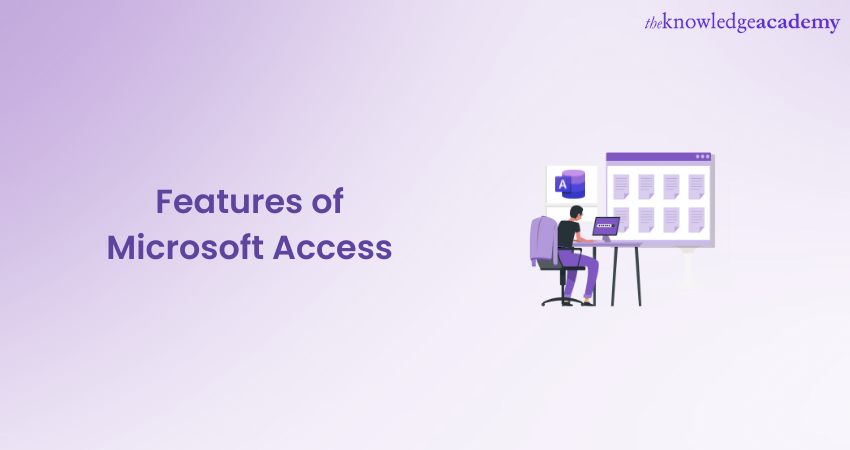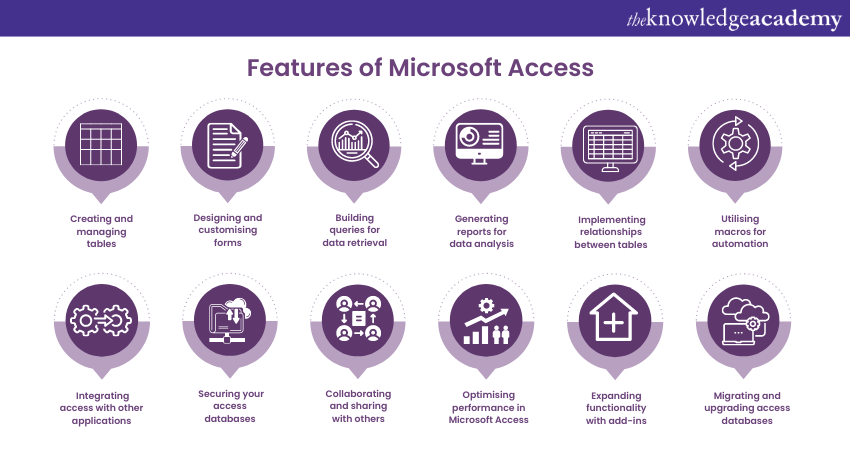We may not have the course you’re looking for. If you enquire or give us a call on +357 26030221 and speak to our training experts, we may still be able to help with your training requirements.
Training Outcomes Within Your Budget!
We ensure quality, budget-alignment, and timely delivery by our expert instructors.

Microsoft Access is a prevalent and powerful Database Management System that offers a wide range of features to help users organise and manipulate data effectively. Irrespective of whether you are a business owner, a student, or an aspiring data analyst, understanding the key Features of Access is crucial for maximising its potential. Further, read this blog to explore the essential Features of Microsoft Access and how they can benefit users in various scenarios.
Table of Contents
1) What are the Features of Microsoft Access?
a) Creating and managing tables
b) Designing and customising forms
c) Building queries for data retrieval
d) Generating reports for data analysis
e) Implementing relationships between tables
f) Utilising macros for automation
g) Integrating access with other applications
h) Securing your Access databases
i) Collaborating and sharing with others
j) Optimising performance in Microsoft Access
k) Expanding functionality with add-ins
l) Migrating and upgrading access databases
2) Conclusion
What are the Features of Microsoft Access?
Let’s expand on the main Features of Microsoft Access.

Creating and managing tables
Tables serve as the foundation of any database. In Microsoft Access, users can create tables with ease, define field properties such as data types, set up validation rules also called microsoft access validation, and apply formatting to enhance data entry. Furthermore, Access provides tools for sorting and filtering data, as well as options for importing and exporting data from other sources, making it convenient to manage and update tables.
Designing and customising forms
Forms in Access allow users to interact with their data in a more visually appealing and user-friendly manner. Access provides a variety of form designing tools, including customisable layouts, themes, and controls. Users can create forms to input data, view and edit records, and perform actions such as calculations and data validations, improving data entry efficiency and accuracy.
Discover the Difference Between Microsoft Access and Excel! Learn which tool suits your data needs best. Boost your efficiency today!
Building queries for data retrieval
Queries enable users to extract specific data from a database based on criteria they define. In Access, users can build queries using a query designer or by writing SQL statements directly. Access offers a range of query types, including select queries, parameter queries, and action queries. With queries, users can retrieve and analyse data from one or more tables, apply filters, calculate aggregate values, and generate calculated fields.
Generating reports for data analysis
Reports are valuable tools for presenting data in a structured format. Microsoft Access allows users to design professional-looking reports with customisable layouts, headers, footers, and groupings. Users can summarise data, create subtotals and totals, apply conditional formatting, and include charts and graphs to visualise trends and patterns. Reports in Access can be exported to different formats, such as PDF or Excel, for easy sharing and distribution.
Implementing relationships between tables
Establishing relationships between tables is crucial for maintaining data integrity and avoiding data redundancy. Access provides a relational Database Management System that allows users to define relationships between tables using primary and foreign keys. By linking related tables, users can ensure data consistency and perform efficient queries across multiple tables using various microsoft access data types, facilitating data analysis and reporting.
Utilising macros for automation
Macros in Microsoft Access enable users to automate repetitive tasks and streamline workflows. Users can create macros that perform a series of actions, such as opening forms, running queries, or generating reports. With Access's Macro Designer, users can build macros using a visual interface without needing programming skills. Macros can significantly increase productivity by reducing manual efforts and allowing users to focus on more critical tasks.
Looking for an Alternative to Microsoft Access? Discover powerful database tools that fit your needs and enhance your productivity today!
Integrating access with other applications
One of the most important Microsoft Access features and benefits is that it seamlessly integrates with other applications, enabling users to import and export data effortlessly. Users can import data from Excel, CSV files, or other databases into Access, ensuring data continuity. Similarly, Access allows users to export data to different file formats, making it compatible with other software like Excel or Word. Integration with other applications enhances data sharing, collaboration, and the overall efficiency of Data Management processes.
Securing your Access databases
Data security is paramount in any Database Management System. Access provides several security features to protect sensitive data. Users can set up user-level permissions to control access to databases, encrypt databases with passwords to prevent unauthorised access, and implement data backup strategies to ensure data recovery in case of unexpected events. By leveraging these security features, users can safeguard their data and maintain confidentiality.
Collaborating and sharing with others
Collaboration is essential in many Data Management scenarios. Access allows more than one user to work on a database simultaneously, making it suitable for team projects. Users can set up shared databases on a network or use Access's web-based collaboration feature to collaborate with colleagues remotely. Additionally, Access provides version control features, enabling users to track changes and manage concurrent access effectively.
Optimising performance in Microsoft Access
Efficient performance is crucial for a smooth user experience. Access offers various optimisation techniques to enhance database performance. Users can create indexes on frequently queried fields, compact and repair databases to improve file size and performance, and split databases into front-end and back-end components for better scalability. These optimisation practices ensure that Access databases perform optimally, even with large datasets and complex queries.
Unlock the potential of Microsoft Access for Small Business! Streamline data management, improve efficiency, and drive growth. Learn more!
Expanding functionality with add-ins
One of the most relevant Microsoft Access advanced features is that it allows expanding functionality with add-ins. Access supports the integration of add-ins, which extend the software's functionality and provide additional features. Users can install add-ins to enhance data analysis capabilities, integrate with external data sources, or customise the user interface. Add-ins empower users to tailor Access to their specific needs, making it a versatile tool for diverse Data Management requirements.
Migrating and upgrading access databases
As technology evolves, it's important to keep databases up to date. Microsoft Access offers tools and resources for migrating and upgrading databases to newer versions or alternative platforms. Users can leverage Access's migration wizard and guidance to ensure a smooth transition, preserving their data and maintaining compatibility with the latest features and security enhancements.

Conclusion
In conclusion, Microsoft Access offers a comprehensive set of features that empower users to manage their data effectively. By understanding the key Features of Microsoft Access as outlined in this blog, you can harness the full potential of Access to help streamline your Data Management processes, improve collaboration, and make informed business decisions.
Enhance your Microsoft Access skills with our comprehensive Microsoft Access Masterclass Course!







 Top Rated Course
Top Rated Course



 If you wish to make any changes to your course, please
If you wish to make any changes to your course, please


